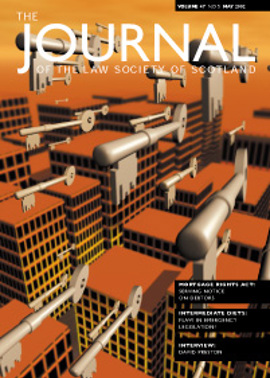Breaking the mould
Scotland’s first solicitor advocate QC, Craig Connal, tells Roger Mackenzie about the procedure – and delays – leading to his appointment
News of Scotland’s first – and so far only - solicitor advocate QC may not have been welcomed in some quarters, but Craig Connal’s recent appointment marks the natural conclusion to a process which began in 1990 when extended rights of audience were granted for solicitor advocates.
For a procedure that caused so much angst – speculation suggests that the appointments were delayed by strong resistance from the Faculty to the principle of solicitor QCs - Craig Connal doesn’t expect it to make a fundamental difference to his career, viewing it more as an “honour”.
“My understanding is that the Bar as a body were very much opposed to the idea, arguing that the title was their exclusive province, notwithstanding that a number of solicitors had been appointed QCs in England. We, however, understood that the principle had been accepted when Rights of Audience were first introduced back in the early 90s.
“I have heard that their opposition is at least partly responsible – though the change of Lord President was also a factor - for the delay in this list being issued, which is equally unfortunate for the ten members of the Bar on the list”, said Craig Connal.
“A number of top QCs, particularly on the civil side, have gone out of their way to congratulate me. I suspect there are some I know or with whom I have worked who have specifically not done so. Others have offered personal congratulations but said they are opposed in principle, which is a perfectly tenable position.
“Some pleasure has been expressed that the appointment went to someone who is actually at the coalface, or as one Junior said to me, someone who has been “up here taking the flak like the rest of us.”
What was the procedure for becoming a QC?
“There was no real indication of what one was meant to do. I was staring rather blindly into the dark. Essentially it’s a case of applying to the Lord President with an outline of one’s history, professional experience and names of referees.
“ I assume that previously it was not a very formal process. As the Bar is a rather tight knit community the Dean will know all his members, whereas the Law Society didn’t feel able to offer a substantive view on my merits or otherwise.”
So what difference will QC status make to him and his practice?
“In a practical sense little changes. I’m happy to accept work from wherever it comes if it’s within my areas of interest. I would anticipate most of my cases would continue to come from McGrigor Donald work, but like other solicitor advocates, if matters come from elsewhere I’m happy to take them on.
“I’m not anticipating in the short term that it will make a huge difference. It is difficult to know ultimately how client decisions are made! My best guess is that at one end of the spectrum of clients are organisations who aren’t familiar with litigation but have heard of QCs, think the label is a special thing and think they should employ one. At the more sophisticated end of the legal market, eg. those who have been operating in the English litigation field, clients may well take the tag as an external guarantee of a certain standing in the profession. In essence it’s a badge of quality for the firm’s practice.”
For solicitor advocacy in Scotland, it’s something of a fillip. Welcoming the appointment, President of the Society of Solicitor Advocates, Frank Maguire said: “This appointment gives a good message that what matters to the public and our clients is advocacy. This is the first, but there will be more. There are high standards of advocacy across the board, many of whom happen to be solicitors.”
Craig Connal said: “I hope it might encourage people who are wondering about solicitor advocacy that it is possible to achieve this accolade.”
There has been a suggestion that the Faculty lacks specialists and that in comparison to their counterparts in England, there simply isn’t the choice available when instructing counsel – could more solicitor advocate QCs rectify that problem?
“The size of the Bar in Scotland doesn’t sustain the sort of specialisation that exists in England. At the civil bar, there are relatively few QCs at the top covering the range of commercial work. To specialise very closely there needs to be enough work to justify that. For example, it is arguable there is now a need for specialists in intellectual property, but five years ago that wouldn’t have been the case and very narrow specialisation brings its own risks.”
The natural next step would be The Bench. Does Connal harbour ambitions in that direction?
“My personal view is that’s about ten steps too far for the establishment to contemplate. Naturally like most people I would be very flattered to be asked to become a Court of Session judge but my guess is that while a Solicitor Advocate will achieve that post, it will be after my time.
“In the future, when there are a number of senior solicitor advocates, one will come through to become a judge. If you ask me where I’d like to be in ten years’ time, it would be on my feet in the House of Lords defending a case I’d won in the Inner House.”
In this issue
- Sleeping with the enemy
- No compelling grounds for retrospective legislatio
- Serving notices under the Mortgage Rights Act
- Breaking the mould
- Karl Construction strikes again
- Lure of the law still strong
- More preparation for practitioners and sheriffs
- The Preston front
- Website reviews
- Finding, keeping, sending
- Omissions cause most claims
- In practice
- A modern way to meet
- Europe
- In and out of the Houses
- Book reviews






